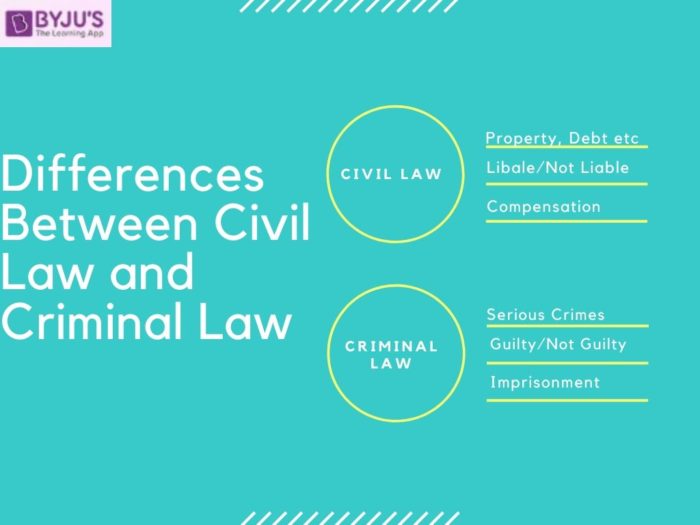
The Major Differences between Civil Law and Criminal Law are:
| Civil Law |
Criminal Law |
| Civil Law is a general law that solves disputes between 2 organisations or individuals. As per Civil Law, the wrongdoer will have to compensate the affected organisation or individual. Civil Law deals with Property, Money, Housing, Divorce, custody of a child in the event of divorce etc. |
Criminal Law deals with offences that are committed against society. It gets out varying degrees of punishment commensurate with the crime committed. Criminal Law will deal with serious crimes such as murder, rapes, arson, robbery, assault etc. |
| Civil Law is initiated by the aggrieved individual or organisation or also known as ‘plaintiff.’ |
The Government files the petition in case of criminal law. |
| In case of Civil Law, to start a case, the aggrieved party needs to file a case in the Court or Tribunal |
As per Criminal Law, to start a case, a petition cannot be filed directly in a court, rather the complaint should be first registered with the police, and the crime needs to be investigated by the Police. Thereafter a case can be filed in court. |
| The objective of Civil Law is to protect the rights of an individual or organisation and make sure that he or the concerned organisation receives compensation for the wrongs that they have suffered. |
The purpose of Criminal Law is to punish the wrongdoers and protect society, maintain law and order. |
| In Civil Law, the wrongdoer gets sued by the complainant or the aggrieved party. |
In Criminal Law, the accused person will be prosecuted in the court of law. |
| In the case of Civil Law, there is no punishment like Criminal Law, but the aggrieved party receives the compensation and the dispute gets settled. |
In the case of Criminal Law, punishment is meted out as per the seriousness of the criminal offence committed or a fine could be imposed. |
| In the case of Civil Law, the power of the court is to pass judgement or injunction to compensate for damages caused to the aggrieved party. |
In the case of Criminal Law, the powers of the court are charging a fine, imprisonment to the guilty of a crime, or discharge of the defendant. |
| In Civil Law cases, the defendant is considered to be either liable or not liable. |
In Criminal Law parlance, the defendant is considered either guilty or not guilty by the court. |
These are the main differences between Civil Law and Criminal Law of India. The differences given in the above table can help the UPSC Civil Service Exam aspirants to answer any related questions easily in the exams.
After learning about the Civil Law and Criminal Law difference, it is better to know the details of the Indian Penal Code – its history, structure, recent developments; 25 most important Supreme Court judgements including Kesavananda Bharati case, Minerva Case; Malimath Committee, Criminal Courts; Indian Judiciary – Supreme Court, High Court, District and Subordinate Courts, Law Commission of India, International Criminal Court, Uniform Civil Code, and Judicial Overreach in India, along with examples very thoroughly. Visit the below-given links to learn about the Indian Penal Code, Indian Judiciary and a host of other information related to the Laws of India, in detail along with other information.




